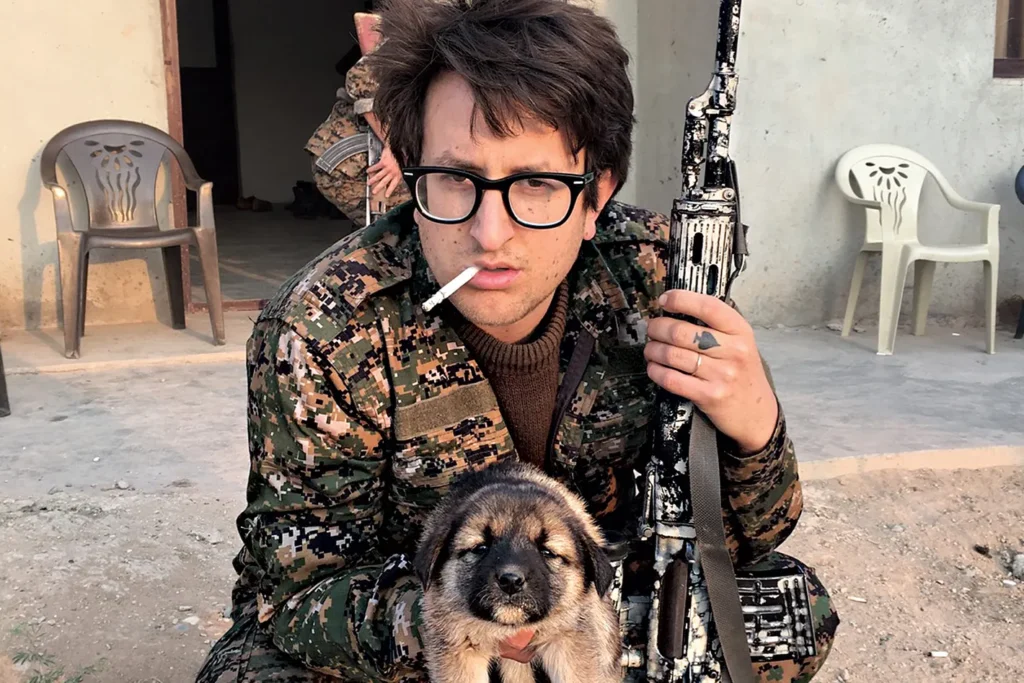Brace Belden is a call that has gained attention in both activist and media circles. Known for his particular journey from a punk musician and florist to a fighter in the Syrian Civil War, Belden has captured public hobby along with his unfiltered takes on politics and his experiences inside the area. His story is a testament to the unconventional paths people take on the lookout for purpose, justice, and identity.
Early Life and Background
Born and raised in San Francisco, Brace Belden grew up in a politically energetic household. His early years had been marked by means of a deep fascination with radical left-wing politics, which would later define a great deal of his person life. As a teen, he have become involved inside the punk rock scene, a tradition recognized for its anti-establishment ethos. This rebellious streak extended beyond song, shaping his ideological ideals and pushing him closer to activism.
During his adolescents, Belden worked in various peculiar jobs, such as as a florist, an revel in he has humorously referenced in interviews. However, despite his ordinary jobs, he maintained a sturdy commitment to leftist politics, regularly expressing his critiques thru writing and online systems.
Fighting inside the Syrian Civil War
Brace Belden’s existence took an great flip in 2016 when he traveled to Syria to sign up for the YPG (People’s Protection Units), a Kurdish armed forces organization fighting against ISIS. His choice become driven by way of a mix of ideological conviction and a desire to make a contribution to what he noticed as a simply purpose. The YPG, aligned with leftist and feminist ideas, become engaged in an extreme battle against the Islamic State, and Belden noticed it as an opportunity to put his beliefs into motion.
His time in Syria became not with out its demanding situations. As a person and not using a prior army revel in, he needed to adapt quick to the realities of conflict. He participated in several battles, experiencing firsthand the brutal nature of the battle. Despite the risks, Belden remained devoted to his task, incomes popularity both among his fellow fighters and on social media.
His presence in Syria, along side different Western volunteers, sparked debates about the position of foreign opponents in conflicts overseas. Some regarded him as a hero preventing for a noble reason, whilst others criticized his selection as reckless or naive. Regardless of the talk, his story received sizeable media attention, main to interviews and features in various courses.
Media Presence and Podcasting
After coming back from Syria, Brace Belden transitioned into a new section of his life as a media parent. He co-based the podcast “TrueAnon,” which delves into conspiracy theories, politics, and critiques of capitalism. The podcast, co-hosted with Liz Franczak, quickly gained a cult following, attracting listeners who appreciate its raw, unfiltered statement.
“TrueAnon” covers a extensive range of subjects, from the Jeffrey Epstein scandal to critiques of neoliberal policies. Belden’s particular attitude, fashioned by means of his stories as a soldier, activist, and punk musician, provides intensity to the discussions. His storytelling capacity and darkish humor make the podcast attractive, helping it stand out inside the crowded global of political media.
Through “TrueAnon,” Belden maintains to recommend for leftist causes, the use of his platform to assignment mainstream narratives and highlight troubles he believes are omitted by means of traditional media. His transition from a frontline fighter to a media persona reflects his adaptability and persisted determination to his ideals.
The Legacy and Influence of Brace Belden
Brace Belden’s journey from a rebellious punk rocker to an international fighter and media determine is not anything short of extraordinary. His willingness to take risks and decide to his beliefs, whether in conflict or in media, has made him an exciting and polarizing parent.
For a few, he represents a brand new kind of activist—someone who doesn’t just speak about exchange but actively seeks it out, even at terrific personal threat. Others question the effectiveness of such actions, arguing that real alternate calls for long-term systemic efforts instead of symbolic gestures. Regardless of wherein one stands on the issue, there is no denying that Belden has left a mark on the political landscape.
His tale raises critical questions about activism, battle, and the role of individuals in shaping history. Whether as a soldier, a commentator, or a provocateur, Brace Belden maintains to undertaking the repute quo in ways which might be both inspiring and controversial.
Conclusion
In an technology where political engagement frequently feels performative, Belden’s willingness to place himself in harm’s way for his beliefs sets him apart. His legacy remains being written, but one thing is apparent—Brace Belden isn’t afraid to combat for what he believes in, whether at the battlefield or behind a microphone.
